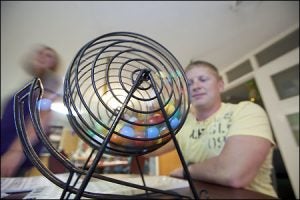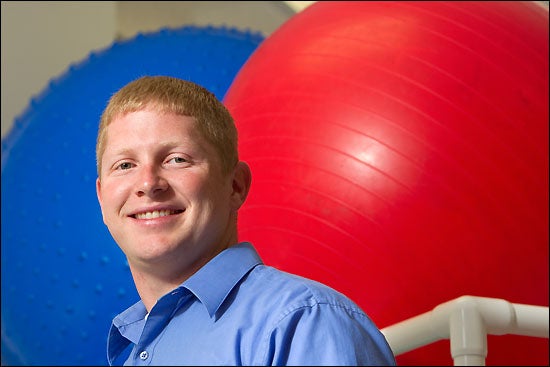Leadership for all
Giving students tools they need to work inter-professionally
Trey Elam’s leadership experience started early, in church, where he still volunteers as a Baptist Men’s Association World Changer.
The 24-year-old occupational therapy graduate student is student liaison to the dean’s office and he chairs the Student Leaders Council in the College of Allied Health Sciences. He heads a group of 14 student representatives from each of the degree-granting departments in the college.
His undergraduate degree is in recreational therapy. One of his favorite leadership roles was as a Babe Ruth baseball coach for 13-15 year olds in Fairmont, his hometown.
As a longtime volunteer for World Changers, he supervised crews of teenagers who repaired roofs and windows or painted houses for the needy. Three years of overseeing young workers with no construction experience in places such as Chattanooga, Norfolk and across North Carolina reinforced the importance of teamwork.
“If you’re a leader in anything, you’ve got to learn how to distribute tasks,” Elam said. “I learned to be a delegator.”
Honing those leadership skills hasn’t been happenstance. A plan to promote student leadership in the College of Allied Health Sciences has come straight from the top, from Dean Stephen Thomas to council advisor Dr. Beth Velde to Elam’s research mentor Dr. Leonard Trujillo. Training and preparing leaders is one of five strategic directions adopted by ECU.
Developing student leaders is an integral part of student education, Dr. Thomas said.
“Allied health professionals must be change agents as health care changes to adapt with societal needs,” Velde said. “Preparing our students to be leaders is the first step in the process.”
Student leadership is a key component in the college’s strategic plan. Students get broad leadership opportunities. Courses stress and reinforce leadership skills. The college also recognizes students who demonstrate ability as leaders.

Elam volunteers on a service project at bingo night at Red Oak Assisted Living Center in Greenville.
The college received a $20,000 BB&T grant in December to expand its preparation of student leaders and to work closely with the College of Nursing, its neighbor in the Health Sciences Building. In the working world, physical therapists, speech language pathologists or rehabilitation counselors work side by side with nurses and doctors as part of a health care team.
“With the many changes occurring in health care delivery, we will need a cadre of future leaders to help find new ways to make health care economically viable and effective. It takes strong leadership to bring about successful improvements in health care,” Thomas said. “A critical role of leadership will be the creation of an inter-professional health care culture where the many health disciplines can work together to advance better health for everyone.”
As part of the grant, officials will work to strengthen mentoring and faculty-student relationships. A leadership conference on reinforcing inter-professional skills and new courses will be started for students in allied health sciences, dental medicine, nursing and medicine. Through the creation of a health sciences leaders council modeled after allied health’s student leaders council, students in the health sciences division will have the chance to meet regularly to develop team working skills and promote understanding of professional differences and similarities.
“Hopefully, if students learn to collaborate across disciplines while in school, they will be better prepared to enter the health care system able to work effectively together,” said Dr. Elaine Scott, director of the East Carolina Center for Nursing Leadership.
Occupational therapy graduate student Sarah Peterson already participates in team work through clinical field work and volunteering at ECU’s Adapted Sports Day. There, recreational therapists, physical therapists and occupational therapists and others come together to support athletes with disabilities.
“They are different therapies, but together they make the big picture,” Peterson said, adding that sometimes patients don’t know the difference between therapists. “We even have pre-conceived notions ourselves.”
Robyn Sauls of Farmville, a graduate student in speech language pathology, said providing mentoring and collaboration opportunities for students while in school is important. “The current students in undergraduate and graduate school are the future of the workforce,” she said. “It is essential that leaders help facilitate the growth of students academically and emotionally. We can always learn from others’ experiences.”
